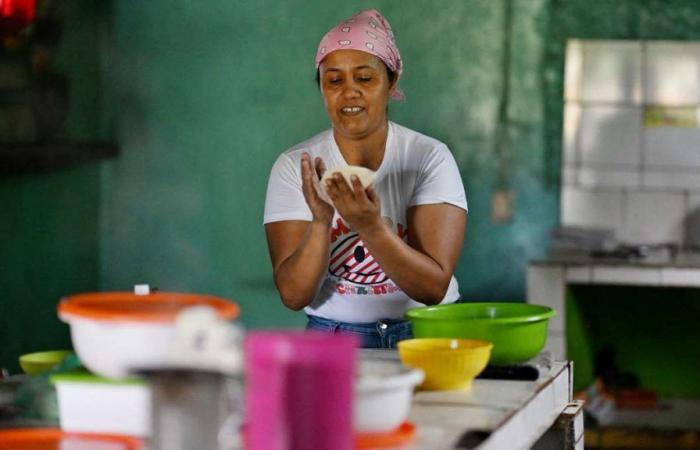Corina Hernández works in the kitchen preparing empanadas at her restaurant in the town of Corozopando, Guárico state, Venezuela, on May 30, 2024.
Photo: AFP – JUAN BARRETO
Recently, a car stopped in front of a modest restaurant in the state of Guárico, on the vast plains of Venezuela. The driver shouted from behind the wheel: “Are you the ones whose business was shut down by the government? “I want a photo with you.”
The man got out of the car at full speed and approached Corina Hernández, 44, one of the owners of the restaurant. And she took a selfie. “We are all outraged,” she told him.
Corina and her sister Elys Hernández have become unlikely political heroines, just as Venezuela heads for its most competitive elections in years.
His transgression? Sell 14 breakfasts and some empanadas to the main opposition figure in the country. The government’s response came a few hours later: an order forcing the sisters to temporarily close their business.
Their case was widely shared on the internet, turning them into symbols of rebellion for Venezuelans tired of the country’s authoritarian leaders. (The sisters have since gained a large online following far beyond Venezuela and have rebranded their products as “freedom empanadas.”)
But her business is only one of several that have felt the government’s retaliation after offering daily services to President Nicolás Maduro’s main political opponent, María Corina Machado.
Machado, a former legislator and a vocal critic of Maduro, is not even a candidate, but she is taking advantage of her popularity to campaign alongside and on behalf of the main opposition presidential candidate.
And wherever she goes during the campaign, the people who help her are harassed by the authorities. In recent weeks, those affected include six sound equipment operators who were working at a rally, a truck driver who was collecting supplies at a campaign event in Caracas, and four men with canoes who provided transportation in a humble Venezuelan town.
Some people said in interviews that they have been detained for hours, and taken to Helicoide, a notorious detention center. Others have had their equipment confiscated and their businesses closed, taking away their livelihoods.
“Those days we didn’t have anything to eat,” said truck driver Francisco Ecceso, referring to the 47 days that, according to him, his vehicle was detained by the police.
For opposition figures and analysts following the decline of the country’s democracy in recent years, these types of persecutions are clear signs that the government is looking for new ways to suppress the opposition and show its power.
Whatever the motivation, there is widespread consensus that the vote scheduled for July 28 poses the biggest electoral challenge to Maduro’s 11 years in power.
For the first time in years, the opposition is united around a single figure – María Corina Machado – who has broad support from voters. When the Maduro government banned her from running, her coalition managed to get a replacement, a soft-spoken former diplomat named Edmundo González, to run.
Polls show that the majority of Venezuelans plan to vote for González, and that they are frustrated by widespread hunger, poverty and rising levels of migration, which have forced families to be separated.
The Hernández sisters run their restaurant, Pancho Grill, in the small town of Corozo Pando, a five-hour drive south of Caracas, in one of the poorest areas of the country. In total, there are five Hernández siblings—four sisters and one brother—but Corina and Elys run the restaurant together with their aunt Nazareth.
In this region, after an economic crisis that began in 2015, people who previously had decent jobs now make a living looking for scrap metal to sell, and mothers have resorted to hunting small báchyros, a pig-like animal, and rodents known locally as picures, to feed their children.
The Hernández family has owned Pancho Grill for 20 years, where they sell breakfasts based on meat, eggs, beans and arepas.
Empanadas, a staple of the Venezuelan diet, come fried and crispy, fresh from the pan, filled with cheese, shredded beef or chicken and served with a generous helping of sweet chili sauce—made with the country’s favorite red pepper. country—next door.
Their shop bears the scars of the economic recession: the kitchen is covered in rust due to a leak in the ceiling, the refrigerators are damaged, and prolonged power outages mean the Hernández women often have to work in the dark.
At the end of May, and in the middle of some campaign events, Machado stopped at Pancho Grill with his team, and bought them breakfast and posed in several photos with the Hernández family.
But the opposition leader had just left when the sisters received new visitors: two tax regulators and a National Guard, who told them that they were going to temporarily close the business.
According to officials, the sisters did not keep accounting books or declare their income, among other things.
The sisters did not refute these accusations. But they said that in their two decades of business, they had never received a visit from the tax agency. And, in a region where these types of violations are common, no one else in town was inspected that day.
The authorities informed the Hernández family that their restaurant would be closed for 15 days.
Representatives from the tax agency did not respond to an email requesting comment on the situation.
At first, the Hernandez sisters were devastated. But they had recorded her interaction with regulators and sent it to one of her daughters. The young girl decided that she too could share the family experience with some friends.
The video spread quickly across the internet and soon outraged supporters were visiting the restaurant as if on a pilgrimage. Donations appeared at the door: spices to season the empanada fillings, a 15 kilo bag of corn flour. And funds began to arrive from Colombia, Brazil, Mexico and even Germany.
Many people placed orders for empanadas, along with instructions for the family to distribute them to locals in need.
Recently, at her restaurant, Corina Hernández commented that Machado could have been sent by God. The government’s retaliation had become, paradoxically, a blessing.
“Life changed for us since María Corina came to buy the empanadas,” he said. “Everything got better.”
After the 15-day closure, the sisters reopened the restaurant and paid a $350 fine with the help of their new supporters, they said. Hernández said she had not voted since 2006, when she voted for Hugo Chávez, Maduro’s predecessor. (Maduro was the candidate chosen by Chávez to succeed him as president).
But she said the sanction from the tax authorities had convinced her that she had to show up on July 28, this time to vote for the opposition.
Although the Hernández family is back in business, not everyone who has had incidents with the government has been so fortunate.
The six sound operators spent hours in detention, terrified of being locked up for years, one of them said in an interview. In the state of Zulia, in the far west of the country, hotels that hosted Machado’s team now have “closed” signs on their doors.
Employees at one of the hotels said the establishment lost a lot of money after being forced to cancel First Communion celebrations planned at its two restaurants.
Five hours by car south of Pancho Grill, in Apure state, a wooden canoe that was confiscated by authorities lies face down on a beach next to a National Guard command post.
Days before, Machado was in the town of Puerto Páez, in Apure. Local organizers had passed through the streets with megaphones announcing his presence, and townspeople attached yellow balloons to a truck, which he later used as a platform to address voters. The streets were filled with people.
The next day, four boatmen with motorized boats agreed to take Machado and his team to their next campaign stop. The boats were confiscated shortly after, according to interviews with three of the boatmen, and the National Guard later visited one of their homes. There, two guards told the wife of a boatman that they had “orders from the bosses of Caracas” and they intended to arrest her husband.
The man was not there, because he had hidden himself. Now, the boatmen move from house to house, sleeping in a different place each night.
National Guard representatives did not respond to an email seeking comment.
But the wife, who asked not to be named for fear of further retaliation, said her husband’s decision to transport Machado was the right one. “I have no regrets,” she said.
“I have faith in God that she is going to win,” he said, referring to Machado, whom many voters recognize as the true political force behind González, “and that everything is going to change.”






